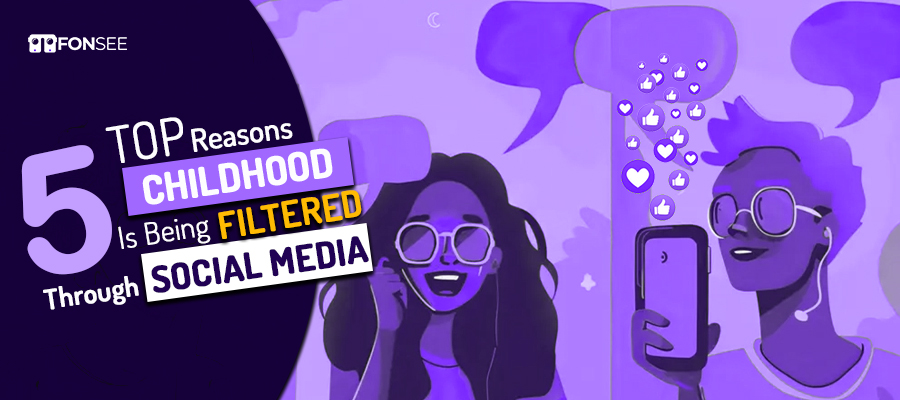Childhood is a period when children live their lives in complete peace and nicety. Time that has passed never returns, and in the same way, childhood never comes back. Today’s era is very different from the past. Nowadays, online games have become a prevalent means of play for kids. Social media becomes a source of enjoyment for them as they interact with friends online. They are losing interest in the real world. TikTok and Instagram reels, likes & comments are meant for them. They are following the viral trends on TikTok and challenging themselves to match the filtered reality of influencers. It impacts the psychological health of kids; sometimes they lose their sense, and because of this, they are unable to acknowledge their own worth.
In this blog, we will discover the Top 5 reasons why childhood is being sieved through social media. Parents need to be aware of the dangers present and understand the steps that can help correct the situation and restore balance. FonSee enables parents to secure their children online without compromising trust.
Five reasons why kids are involved in Social Media
1- Advancement Digital Playground
Kids’ social life was limited to playing in parks with their friends in the past; it’s hit different. Nowadays, it has developed into an online playground. Now, social media platforms like WhatsApp, TikTok, Instagram, and Snapchat are meant for children. The online environment has no peripheries; as a result, kids are increasingly drawn towards it.
Because of this, kids are increasingly drawn towards it. Children are making friends on social media through likes and comments. It is also an alerting sign for parents because strangers are not trustworthy. Kids have started giving more importance to their online friends, leaving their real-life friends. Due to social media, kids are losing their social interest, which can cause them problems later on.
2- Social Media as the New Mirror
The pursuit of a mirror is one that every child wants. Not necessarily just the one on the wall, but rather the projection of the reflection of who they are and how others view them. Previously, such reflection was based on the loyalty of adults, friends, and personal accomplishments. Now, the mirror is shining at their iPhones & Androids. Social media feeds have become a substitute for the encouragement provided by parents or teachers. Providing a distorted image of filters, pre-packaged lifestyles, and viral beauty ideals.
Children are exposed to super-idealized photos that have been manipulated and often posed. It is essential to consider why social media’s unrealistic content has a greater influence on them. This need for validation can harm their self-esteem, leading to feelings of anxiety, insecurity, or confusion about their true identity. Instead of developing themselves better, many young people imitate role models and lose their individuality as they strive for digital perfection.
3- Coercion of Always Being
Before the digital age, childhood hit different. When kids were free, they would play with their friends, spending their free time. But today, they are totally immersed in social media platforms. They prefer to spend their free time on social media rather than being available online at night. Social media eradicates the natural social environment for kids.
Nowadays, kids are under pressure to be constantly available. A complete effort is made to reply quickly, but this action brings along a fear of missing out. This negatively affects the child’s mind and makes them emotionally disturbed.
Sometimes they are unable to focus on their studies. They are only taught about social media at school, and then they go home and spend more time on screens.
4- Childhood Games Replaced by Explosive Challenges
In the era when playtime consisted of making up your own rules. But now everything is contrary. Social media drew kids in itself. Most of that has since been superseded by viral challenges. They take these online game challenges as fun and get wholly involved in them.
Primarily, kids see themselves as pranksters, with their focus being on how to grow their followers. In these cycles, they begin to be deprived of their true creativity. As everyone knows, true creativity can only be gained through social life. Due to social media platforms, kids don’t think about their own minds; they only do things that are widespread on the Internet. This shows how social media has taken away precious time from children, which could be harmful to them.
5- The Explosion of Childhood
Among the most upsetting innovations is that childhood has become a market on social media. Platforms are not only meant to connect — they aim to attract attention and cause action. The children are the victims of less blatant advertising where role models sell toys, clothing, food, and lifestyles, and the browsing data provides even more addictive content. This has led children to think like consumers rather than explorers. They pursue what is trending instead of discovering what brings them happiness. Childhood has traditionally been characterised by being imaginative and curious, individualised and creative. It is no longer.
The Outcomes: What we peril losing
1- Loss of socializing in the real world
Children would miss out on practicing empathy and conversation skills if they become more involved in online chatting than in face-to-face interactions. This will, in the long run, affect their ability to build good offline rapport.
2- Elevated anxiety and depression
As you know, Social media influencers portray themselves as strong. In fact, those people rely on filters and beauty enhancements, but kids don’t realize it. Just by watching them, kids develop a desire to become famous themselves. Children start to evaluate self-esteem based on likes and comments. The desire to have more makes them fall prey to anxiety.
3- Reduction of physical activities and outdoor play
Reduced time on screens and computers means less time for playground activities, sports, and exercise. This sedentary lifestyle can lead to obesity, physical inactivity, and a decrease in vitality in young children.
4- Greater exposure to online bullies or harmful content
Unsupervised, children may chat with strangers or even gain access to overtly sexual or controlling content. This threatens their lives, as well as their emotional security.
5- Loss of interest in family due to the internet
Excessive screen time can break the bond with family. Even when they sit with their family in free time, they keep scrolling and laughing instead of talking to them. Because of this situation, parents become emotionally disturbed by their children’s situation.
Solution to manage your child’s daily activities from FonSee
What is FonSee?
FonSee is a digital monitoring tool that monitors all activities on Android phones. Features include real-time location, social media apps, live chat or call recording, and video. It is helpful for parents, employers, and individuals.
The Role of Monitoring Tools: How FonSee Helps Parents
With the help of an advanced monitoring tool from FonSee, it doesn’t mean you are monitoring kids. The primary goal is to establish a healthy balance routine for your child and safeguard them from online threats.
How FonSee Sustains Parents:
Now, explore how FonSee, the outlandish tool, meets the requirements of the concerned parents.
1-Activity Discernment
Monitors the amount of time that children spend using apps such as TikTok, Instagram, or YouTube. Enables parents to have an explicit reflection of the usage patterns.
2-Content Alerts
Pick up unwanted keywords, abuse, or suspicious messages. Does not show every message that is sent to the parents, but alerts them as soon as red flags are in place.
3-Healthy Screen Time Control
Parents can set realistic limits on daily usage. FonSee locks distracting applications automatically when you are studying or sleeping.
4-Location Safety
In-built GPS tracking gives parents the confidence to know their child’s position. Geofencing alerts are used to alert when children trespass into dangerous zones.
5-Privacy-Friendly
Monitoring, unlike spyware, FonSee does not erode the privacy of children. It does not over-supervise the parent nor the child by monitoring them, but it shows a pattern, not a one-on-one chat.
Final Verdict:
Childhood is where imagination, games, growth, and real human faces come together. It ought not to be strained through a phone screen. Social media can stimulate creativity and provide learning opportunities.
However, it has the potential to rob one of innocence, mental health, and authentic experiences when unchecked. There is no solution in the rejection of technology. The phenomenon is a part of the contemporary world, and hence, it should be learned to be used reasonably. Communication, healthy boundaries, and digital literacy training are essential. Applications such as FonSee help parents guide their children without violating trust. By using awareness, guidance, and responsibility, parents can nurture their children to raise safe and happy individuals. They can prosper online and offline.


